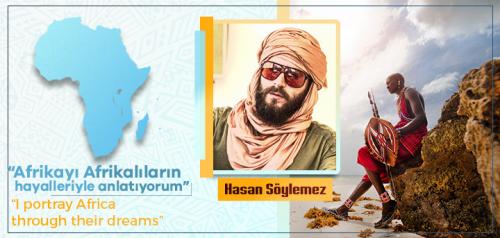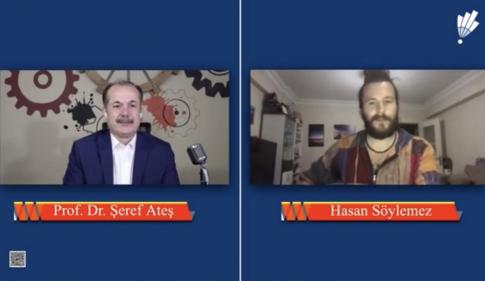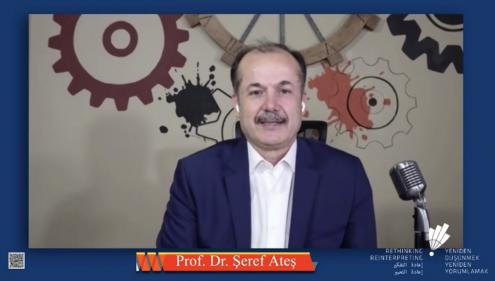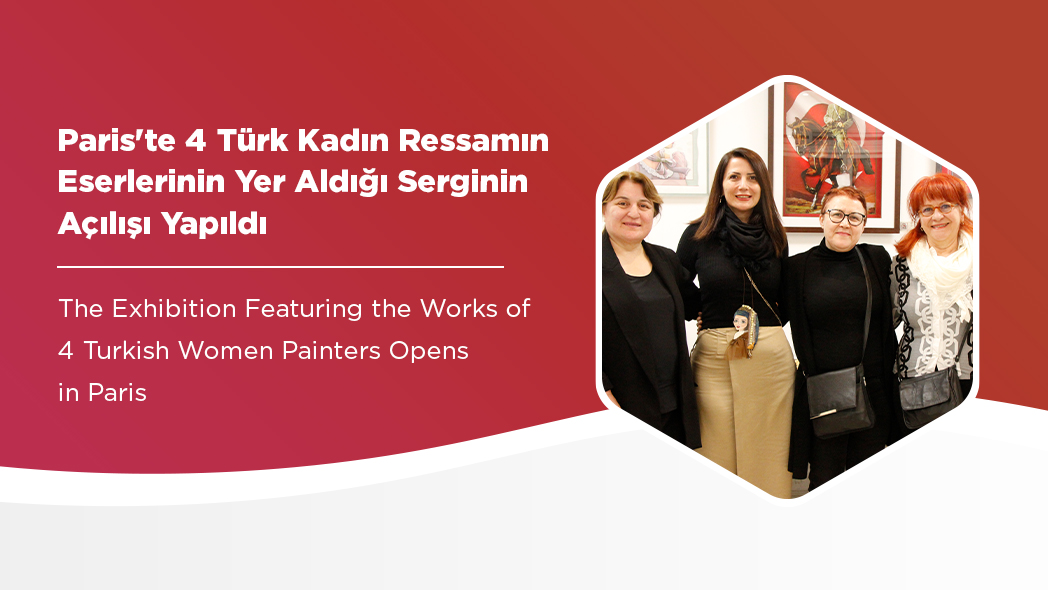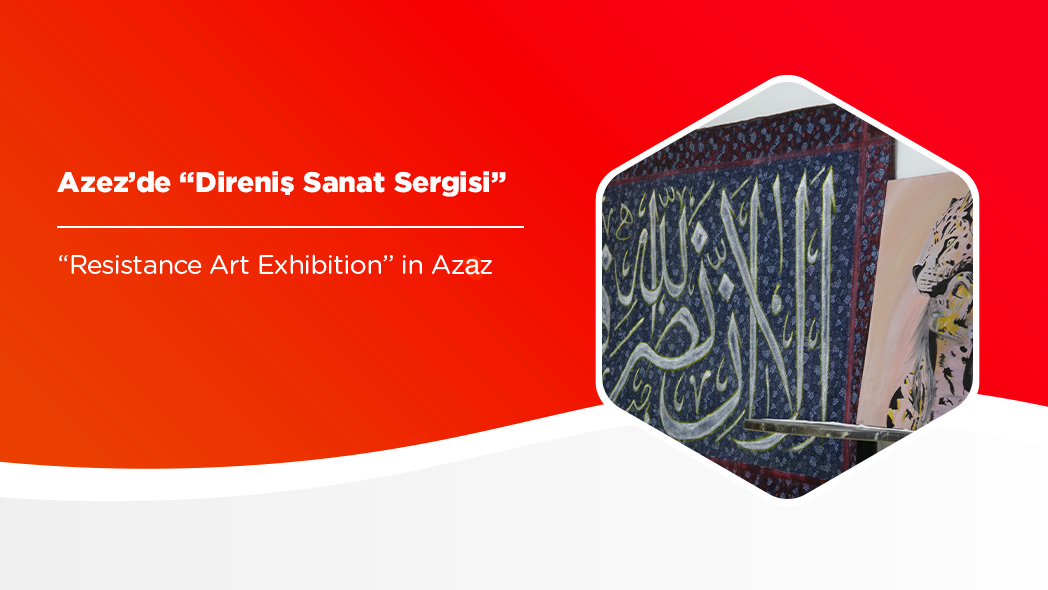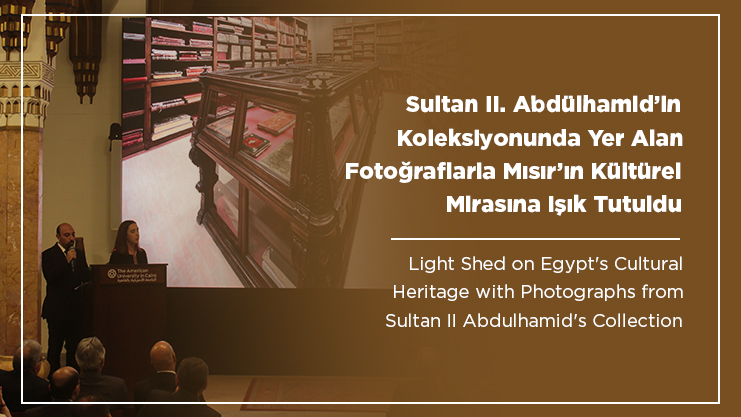"I Portray Africa through Their Dreams"
Yunus Emre Institute has hosted Hasan Söylemez, a contemporary traveler, at the program "Rethinking, Reinterpreting." In the program presented by Institute President Prof. Dr. Şeref Ateş, Hasan Söylemez, who traveled around Africa on his bicycle for his documentary project called "Journey to Dreams," said, "When you bring together the dreams of many people, rather than the dream of only one person, and you examine the answers you get one by one, then you get the profile of the country revealed. In my documentaries, I try to explain Africa through the dreams that African people tell."

At the program "Rethinking, Reinterpreting," Yunus Emre Institute has hosted Hasan Söylemez, who shot a documentary called "Journey to Dreams" while cycling around Africa. In the program presented by Yunus Emre Institute President Prof. Dr. Şeref Ateş, Hasan Söylemez talked about his Africa journey and the unknown face of Africa.
In response to Prof. Dr. Şeref Ateş' question about how he decided to set off for this journey, Söylemez replied that there were many reasons why he loved traveling by bicycle.
"The times that I feel the happiest are when I'm on the road. Whenever I'm on the road, I feel the most peaceful and the calmest. Therefore, the happiness and excitement that roads give me increase my commitment not only to the journey, but also to nature, humanity, and all beings. When I am on the road, when I am together with all living things, I feel like being reborn. So I am always on the road; I am reborn every day." |
I FELL IN LOVE WITH ISTANBUL WITHOUT SEEING ISTANBUL
Hasan Söylemez, who spent his childhood in Muş, said that he had had a great interest in Istanbul since his high school years. He explained his interest in Istanbul as follows:
"I am a person who fell in love with Istanbul without seeing Istanbul. I had photos of Istanbul in my room in Muş when I was in high school. But it was a platonic love, an unexperienced and untouched love. My love for Istanbul, it was untouched, unconnected. I took the university exams and got the right to study in Istanbul. The university became sort of a bridge from Muş to Istanbul for me. So I crossed that bridge and met my lover, that is, my Istanbul. After that, I started studying at the university here. The more I lived in Istanbul, the more I loved it."
Stating that his interest in Africa is similar to his love for Istanbul, Söylemez said:
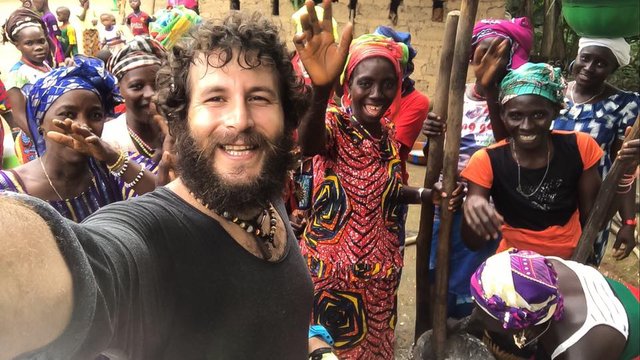 "I started to build a passionate connection with Istanbul. I was both studying at university and working as a journalist. This is how I started the journey. Actually, my journey to Africa started in a similar way. I am a man who fell in love with Africa without ever seeing Africa. Again, I researched photos, documentaries, books, interviews and many other things about Africa. A giant map of Africa hangs on my wall. It's huge and takes up almost half of the wall. I had such a commitment to Africa. I was decided to set off one day, no matter what. So this is how my journey to Africa has started."
"I started to build a passionate connection with Istanbul. I was both studying at university and working as a journalist. This is how I started the journey. Actually, my journey to Africa started in a similar way. I am a man who fell in love with Africa without ever seeing Africa. Again, I researched photos, documentaries, books, interviews and many other things about Africa. A giant map of Africa hangs on my wall. It's huge and takes up almost half of the wall. I had such a commitment to Africa. I was decided to set off one day, no matter what. So this is how my journey to Africa has started."
THIS JOURNEY TAUGHT ME A LOT

Hasan Söylemez said he traveled around Turkey for 10,000 kilometers in 8.5 months and one day when he was on the road he taught about why he never told his father that he loved him.
"There were emotions that journey taught me. Until that day, I had never told my father I love you. When I was on the road, I thought about it and I said to myself: why had I never said 'I love you' to my father? Actually, not saying I love you to my father was not because I didn't like him. I love my father so much and he loves me a lot, too. But in the culture we live in fathers and sons don't say I love you to each other; and after the journey, I called my father and said I love you to him. The journey not only asks questions to you, but it also makes you seek answers to questions. The biggest thing I gained from those questions was that I told my father I love you," he said.
"My goal was to travel around the world without money. I wanted to know both myself and Anatolian people. If I had wanted, I would have taken some money with me when I set off. I wanted to make a journey by completely eliminating money as a hindrance between ourselves, by needing and relying on Anatolian people and people in general." |
"My goal was to travel around the world without money. I wanted to know both myself and Anatolian people. If I had wanted, I would have taken some money with me when I set off. I wanted to make a journey by completely eliminating money as a hindrance between ourselves, by needing and relying on Anatolian people and people in general. When you are in need, you can get to know a person better. First, they said that I would return after a week. I returned to Istanbul after I traveled around the map of Turkey for 10 thousand km in 8.5 months."
BICYCLE IS NOT ONLY A MEANS OF TRANSPORT, A COMMUNICATION TOOL AS WELL
Explaining why he went on his trip to Africa on a bicycle, Söylemez said that there are values added by bicycle to a journey. Söylemez said bicycle is not only a means of transport, but it is also a communication tool:
"One of the biggest reasons for me to prefer bicycle on the African journey is that bicycle is a means of transport, but for me, it is a means of communication. That is because, with bicycle you live by slowing down the time. And you feel alive as you slow the time down. The bike moves slowly. As you move slowly, you meet many people on the road. And you have the chance to sit and chat with them. I shoot documentaries of their dreams. I ask people about their dreams. In bicycle journeys, I have the opportunity to ask the dreams of the people I meet. If I traveled in a car, I wouldn't be able to mingle and communicate with people very easily."
 "AFRICA IS NOT LIKE IT HAS BEEN INTRODUCED TO US"
"AFRICA IS NOT LIKE IT HAS BEEN INTRODUCED TO US"
Hasan Söylemez mentioned that Africa's image in populist rhetoric never reflects the continent and most of the world does not really know Africa. Söylemez noted that he made a documentary based on this reality:
"My goal was to travel around the world without money. I wanted to know both myself and Anatolian people. If I had wanted, I would have taken some money with me when I set off. I wanted to make a journey by completely eliminating money as a hindrance between ourselves, by needing and relying on Anatolian people and people in general. |
"We have heard so much about Africa so far: Africa is a war zone, there is hunger in Africa. There is illness in Africa. There is wildlife in Africa. There is misery in Africa. Africa has always been introduced to us in this way. There are 1.5 billion people living in Africa. Do they all live that way? No. People living in Africa have emotional aspects other than those shown to us. They have dreams, too. What kind of dreams do they have? What are their expectations from the world? None of the documentaries you watched featured these. And I said I would investigate their dreams."
Söylemez, who asked questions to the people he met while he shot documentaries in Africa, stated that the focus of his questions was the dreams of Africans. Describing the five most important questions among those he asked, Söylemez stated that he tried to explain the African continent through the dreams of the Africans:

"After we met, what's your biggest dream? What are you doing to accomplish this? Have you ever had a dream come true? What is your biggest dream about your country? What is your biggest dream about Africa? I think these five questions are so important that the dreams of the people living there must be asked in order to get to know a country. Because dreams provide us with very important clues about the economy of the country, about politics and educational status in general, including the status and the past of the person who tells his dream, as well as many other issues. When you bring together the dreams of many people, rather than the dream of only one person, and you examine the answers you get one by one, then you get the profile of the country revealed. In my documentaries, I try to explain Africa through the dreams that African people tell. That's why I publish them both with English and Turkish subtitles. So I ask those questions not only to African people, but I also ask them indirectly to the viewers. People fear to dream; they are afraid to dream. Because they are afraid of not realizing their dreams. The dreams that are excessively optimistic are galore. I think that you need to learn their dreams to get to know people. Maybe you take a step the next morning to realize that excessively optimistic dream. Once dreams are dreamed, they should not be left somewhere in a bubble. You have to strive, struggle to get the grasp of your dreams more solidly."
Saying that there are returns and feedback from all over the world, Söylemez summarizes the reactions as follows and touches on the importance of realism in documentary shooting:
"Even the citizens of that country say to me; 'We did not know our country like this. 'What kind of country we had, what a beautiful country we had'. Or 'What different issues you touched upon. Thank you very much'. I would like to underline one point: In my documentaries, nothing is dramatized. Whatever I see, whatever I live is directly shown. There is also no need to have music at the background. Whatever it is, I try to show the naked truth."
"MILLIONS OF PEOPLE THINK AFRICA AS ONE COUNTRY ONLY"
Söylemez underlined that there are millions of people from around the world who think Africa, actually consisting of 54 countries, is only one country:
"However, Africa is the second largest continent in the world and there are 54 countries in it. "Whenever I talk about my journey, I say 'travel to 54 countries of Africa'. Actually, the purpose of mentioning the number 54 is not using it to compete the numbers that appear in my passport; I use it to underline that Africa is made up of 54 countries. Although the borders of its countries are separated from each other, in fact, African people have many common features and you definitely encounter those features no matter which country you go to."
"ALL MY PREJUDICES WERE ERADICATED"
"We have heard so much about Africa so far: Africa is a war zone, there is hunger in Africa. There is illness in Africa. There is wildlife in Africa. There is misery in Africa. Africa has always been introduced to us in this way. There are 1.5 billion people living in Africa. Do they all live that way? No. People living in Africa have emotional aspects other than those shown to us. They have dreams, too." |
Söylemez said he had had many prejudices about Africa before the trip and added that it was possible to eradicate these prejudices by living in Africa for a while:
"When I went there, this trip that I made caused my prejudices to be eradicated. The most important was this; When I thought of Africa, I would think that there were people living in conical houses or houses made of clay and many tribes were still living and hunting old ways. So I had such a stereotype in my mind. When I went there, I realized how modern and developed indeed many countries of Africa are. I really did not expect to see such a picture. While I was living there, I learned firsthand how the cities are so intertwined, how strong the communication between people is and how much it affects the inner dynamism of Africa. So I think we can get to know and recognize Africa not through the touristic visits we make, but when we go there and live there for a while."

